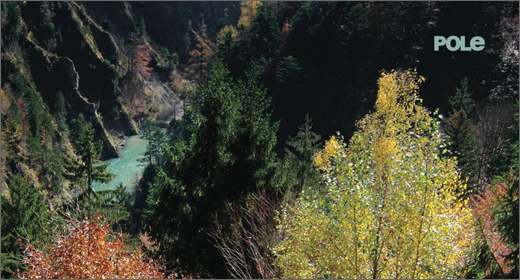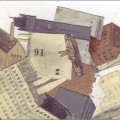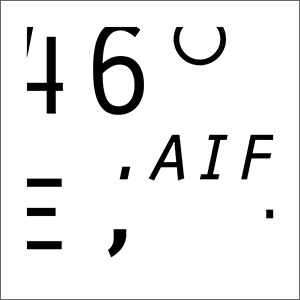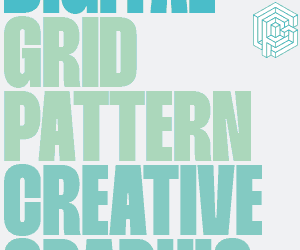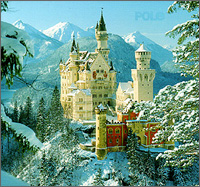 (04.01.07) Stefan Betke’s music has always had a bit of a doleful unromantic disposition about it. Which makes the striking picture postcard cover of Steingarten all the more conspicuous in its total in-congruence. This image of the fantasy-full kitsch-rich castle of Neuschwanstein in Bavaria (a folly of eccentric King Ludwig II, once patron of Wagner) seems an unlikely choice to represent Betke’s grubby dub and clanky Klang. A sign maybe of a lighter hearted mood and an opening out into something more playful and sunnier. Relatively speaking, of course. Pole music, as classically stated on Pole albums 1, 2, and 3, was never much about the hedonic, or the ludic, and always bore the mark of the sound engineer (Betke’s original role for Basic Channel) dragging his solipsistic habit out of the studio somewhere nearer to daylight. The cover is, on reflection, probably a tongue-in-cheek knowing poke at this somewhat dour musical image, and, relatedly, an ironic reference to what is contained, which is a direct polar (pun intended) opposite of the exterior, in its eschewing of rococo excess, its avoidance of ornament.
(04.01.07) Stefan Betke’s music has always had a bit of a doleful unromantic disposition about it. Which makes the striking picture postcard cover of Steingarten all the more conspicuous in its total in-congruence. This image of the fantasy-full kitsch-rich castle of Neuschwanstein in Bavaria (a folly of eccentric King Ludwig II, once patron of Wagner) seems an unlikely choice to represent Betke’s grubby dub and clanky Klang. A sign maybe of a lighter hearted mood and an opening out into something more playful and sunnier. Relatively speaking, of course. Pole music, as classically stated on Pole albums 1, 2, and 3, was never much about the hedonic, or the ludic, and always bore the mark of the sound engineer (Betke’s original role for Basic Channel) dragging his solipsistic habit out of the studio somewhere nearer to daylight. The cover is, on reflection, probably a tongue-in-cheek knowing poke at this somewhat dour musical image, and, relatedly, an ironic reference to what is contained, which is a direct polar (pun intended) opposite of the exterior, in its eschewing of rococo excess, its avoidance of ornament.
Even the name is revealing. Pole. That lugubrious monosyllable. Its origins in a faulty analogue sound filter, the Waldorf 4-Pole, whose defect-generated “noise” was sliced and edited to create scratchy spidery structures – the signature sound of those first three sound-defining albums. It bespeaks a focus on methodology over content, of process over product. Not that materiality is absent. Those early recordings in the late ’90s blended snail-trails of dub with tail-ends of techno to produce something alien, dreamy, remote – strangely resonant for all that they were oddly empty of emotion. They gave off some sort of strange heat, but no warmth; pulse present, but no attendant heart in the beat. And in a sense, Steingarten sees him back mining this vacated zone again, this time with a more clinical hier-fi sound.
Steingarten marks a welcome return for Betke to vocal-less music after his unhappy (well, I was… weren’t you?) hip-hop experiment with the downbeat upwording of Fat Jon. But we find Betke up to oblique strategies. His brittle grooves thud through insistently, but seem more gestural than felt. And where speaker-shaking sub-bass river used to thrum through, that bed is dried up into a background bump. So, there is “Warum,” with its wheezes and frequency-finding flotsam pasted over dry-hump funk, whose main engagement lies in following a sparse funk guitar figure as it gets progressively fuzzed and smeared across the soundstage. Then “Winkelstreben,” which hosts a squall of distorted guitar and defective device noise over a slowed-down techno beat-distillation. “Schöner Land” is the first to let out a sound which is allowed to sustain, all else having been staccato or fuzz/fizz, but as soon as its almost-embrace is out, it’s followed with a white noise face-slap. While still having an edge of the unheimlich, at times Steingarten can strike as almost homely. As architecture, though, it’s more Bauhaus than Our House, in its embrace of functionalism, and the outside-worn skeleton. “Mädchen” (= “Girl”) seems like more of Betke’s dry wit, since its metalwork room sub-skank sounds as divorced from anything girl-related as could be conceived. “Achterbahn” is better, coming on like a funky remix of earlier Pole crossbred with some Chain Reaction DNA slivers, but by the time the tracklist gets round to “Jungs” and its lugubrious space-age cocktail cyber-funk, the listener’s heart, mirroring the listening object, is no longer in it. “Pferd,” finally, gives up a peculiarly romantic melody on a melancholy melodica, but, alas, too late in the day, and its elegiac theme stands sadly representative of what was not. The man who wasn’t there.
Disappointment is the keynote of this appraisal, then, accentuating the negative, eliminating what positive there might be; there is some, but this listener finds himself constantly reminded of the dissonance between Betke’s expressive potential and the inarticulacy of his sensuality-starved realizations. It’s as if he had one ear over-evolved – for sound, and another tin one – for music. A track like “Sylvenstein” illustrates the potential, at once present and thwarted, as he channels the Kraftwerk/Plank spirit of mechanik-motorik by way of a tangential waft of Jamaica, but it occurs gradually as the track proceeds oblivously, that this is a kind of ghost-music. It appears removed from reference to the outside world, hermetic. And throughout Pole reaches back to the anti-harmonic pure audio-centricity of musique concrète, but ultimately finds himself, with nothing to hang this on to, left adrift in the obsession with the fabric of sound itself. We are left then with sounding material absorbed in its own being, lost in nothingness. Lights on, no-one home.
Steingarten is out now on ~scape.










